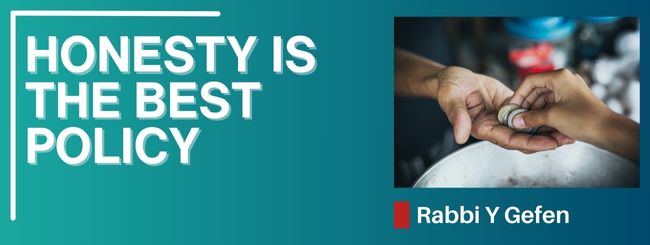בס”ד
Behar (Leviticus 25:1-26:2 )
This week’s Torah portion begins with the laws of Shemmitah, the sabbatical that requires the land (of Israel) resting every seven years, and is immediately followed by the prohibition of onaat maamon, consumer protection laws that protect a buyer from being deceived and over charged. The commentaries discuss the juxtaposition between these two, seemingly unrelated Mitzvot.
Rabbi Yissachar Frand explains that the fundamental idea behind Shemittah is that G-d provided a person with his livelihood, therefore, one will not lose out by refraining from work. Rather, he will actually gain by keeping Shemittah. There are many stories of people who gained financially or did not suffer losses by keeping Shemittah1.
Rav Frand explains that the same principle applies to the laws of honesty in one’s financial dealings. On a natural level level, one would think that a person who cheats is more likely to gain than one who is totally honest. However, by juxtaposing Shemittah to price consumer laws, the Torah is alluding to the fact that in the same way that a person who keeps Shemittah will only gain, one who keeps the laws of honesty in his financial dealings will also ultimately gain.
The following story about Rabbi Yaakov Kamenetsky, related by Rav Frand, demonstrates that honesty can have even greater benefits than just financial success. It is well-known that Rav Yaakov exemplified and personified what it means to be an honest person.
One of Rav Yaakov’s sons was Rav Noson Kamenetsky. Rabbi Noson wanted to trace his family’s roots and went to visit the little European town in which his father had been the Rabbi. While he was there, he discovered a very interesting thing: Even though much of Lithuanian Jewry was wiped out during the Shoah, to a large extent, the Jews of that particular city survived the war and escaped the Nazi Holocaust.
In Rav Frand’s words: “Rabbi Noson Kamenetsky went to the mayor of the town and asked him if he could explain how the Jews of this town were successful in saving their lives. The mayor said, “I can tell you exactly why the Jews escaped.” He said that before the war, the fellow who eventually became the mayor was the postmaster of the town. He would have a test for the clergy members of that town – both Jews and non-Jews. The test was that when they would come in to buy postage, he would purposely give them more change than they deserved, and he would see whether they would return the money or not. That was his acid test of what type of people he was dealing with.
He did this three times with Rabbi Yaakov Kamenetsky. Each time he gave the Rabbi more money than he was entitled to in change, Rabbi Kamenetsky would always return the money. This postmaster was so impressed with the Rabbi, who was the head of the Jewish community, that when years later he was mayor of the town – any time he became aware of a German action which would have wiped out the Jews, he would notify the Jews and they would go hide in the forest or wherever, and that is how the Jews of the city were saved.
When Rabbi Noson Kamenetsky returned to America from his trip to Europe, he asked his father if he had any recollection of the post office, if he remembered the postmaster, and if he recalled these incidents. Rabbi Yaakov said that he did not remember the particular story about being tested, but all he remembered was that the postmaster in town did not know how to count.”
It is clear that Rabbi Kamenetsky’s honest behaviour made a tremendous impression on the postmaster, to such a degree that years later, when he became mayor, he never forgot the Rabbi’s actions and this reflected on the whole Jewish community. The remarkable consequence of this turn of events was that many Jewish lives were saved.
Needless to say, a person does not always reap such rewards for being honest, and there may be times that acting honesty will not immediately lead to financial gain. Yet, the Torah through Its juxtaposition, the Talmud in Bava Metsia, and Rabbi Frand’s story, teach that in addition to gain in the Next World, an honest person is guaranteed to meet with success in this world.
By Rabbi Yehonasan Gefen
- See my Divrei Torah, Behar – 5775 version and Tzav, 2011 version, for great examples of stories in this vein.
WEEKLY TORAH PORTION,
The Guiding Light
by Rabbi Yehonasan Gefen
© Copyright, all rights reserved. If you enjoyed this article, we encourage you to distribute it further.
Our blogs may contain text/quotes/references/links that include copyright material of Mechon-Mamre.org, Aish.com, Sefaria.org, Chabad.org, and/or AskNoah.org, which we use in accordance with their policies.
